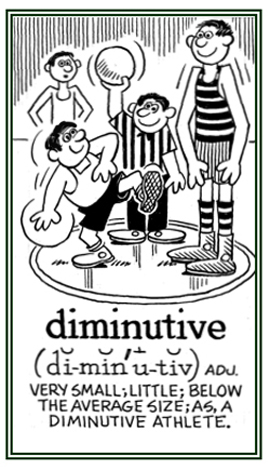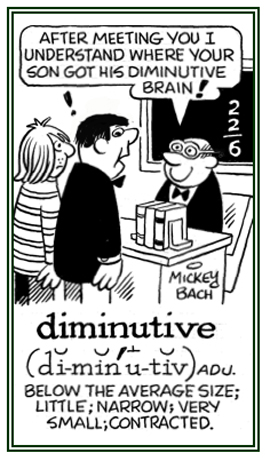mini-, minor-, minut-, minu-, min-
(Latin: small, little, less; decline, decrease, diminish; become less, reduce, becoming smaller or shorter)
diminish (verb), diminishes; diminished; diminishing
1. To make something smaller or less important, or to become smaller or less important; to reduce in bulk or amount; to lessen; opposed to augment or increase.
2. To lessen the authority or dignity of; to put down; to degrade; to abase; to weaken.
3. To contract a perfect or minor musical interval by one semitone.
4. To take away; to subtract; to decrease, lessen, abate, reduce, contract, curtail, impair, degrade.
5. To appear smaller, or to make something appear smaller.
2. To lessen the authority or dignity of; to put down; to degrade; to abase; to weaken.
3. To contract a perfect or minor musical interval by one semitone.
4. To take away; to subtract; to decrease, lessen, abate, reduce, contract, curtail, impair, degrade.
5. To appear smaller, or to make something appear smaller.
diminishable (adjective), more diminishable, most diminishable
1. Relating to something that can be reduced in size, quantity, importance, or intensity: The significance of the source and the value of the assets are diminishable and can dwindle with time.
2. Descriptive of someone or something that is decreased or lessened: Mrs. Smith's reputation as a mayor in the town was proven diminishable due to her disgraceful and scandalous behavior towards the members of the school staff.
2. Descriptive of someone or something that is decreased or lessened: Mrs. Smith's reputation as a mayor in the town was proven diminishable due to her disgraceful and scandalous behavior towards the members of the school staff.
Something that has been reduced in size, quantity, or quality: When Joe closed the windows in his house, the diminishments of the loud noises from the street construction were less irritating.
1. A gradual reduction in force or loudness; antonym of crescendo.
2. In music, a gradual reduction of force or loudness; gradually decreasing in volume; decrescendo.
3. A diminuendo passage. Symbol: >.
4. Etymology: from Italian, present participle of diminuire, "to diminish" from Latin d1minuere, "to reduce".
2. In music, a gradual reduction of force or loudness; gradually decreasing in volume; decrescendo.
3. A diminuendo passage. Symbol: >.
4. Etymology: from Italian, present participle of diminuire, "to diminish" from Latin d1minuere, "to reduce".
1. A lessening, decreasing, or reduction of something, or the result of such a reduction.
2. The act, fact, or process of diminishing; lessening; reduction: "His uncle was experiencing a diminution of his wealth."
3. The repetition of a musical phrase, using notes that are of a shorter duration than in the original phrase.
2. The act, fact, or process of diminishing; lessening; reduction: "His uncle was experiencing a diminution of his wealth."
3. The repetition of a musical phrase, using notes that are of a shorter duration than in the original phrase.
1. A suffix or a word which shows that something or a person is small.
2. An informal identification or form of a name: "Diminutives are used to indicate a name; such as, Richie or Rich for Richard, John for Jonathan, or Gin or Ginny for Virginia."
2. An informal identification or form of a name: "Diminutives are used to indicate a name; such as, Richie or Rich for Richard, John for Jonathan, or Gin or Ginny for Virginia."
diminutive (adjective), more diminutive, most diminutive
1. A descriptive word that is formed with a suffix; such as -let, -ette, -ling, or -kin, to indicate a small size: A diminutive term or name indicates a small size, youth, familiarity, or fondness; for example, a kitchenette, a duckling, or a booklet may suggest that something is appealing or lovable in some way.
2. A reference to a person or thing that is very small or much smaller than is normal: Anything that is diminutive expresses smallness; such as, "ringlet" which is the diminutive of "ring".

© ALL rights are reserved.

© ALL rights are reserved.
Go to this Word A Day Revisited Index
2. A reference to a person or thing that is very small or much smaller than is normal: Anything that is diminutive expresses smallness; such as, "ringlet" which is the diminutive of "ring".


Go to this Word A Day Revisited Index
so you can see more of Mickey Bach's cartoons.
diminutively (adverb), more diminutively, most diminutively
Relating to or descriptive of something that is less than normal: Gerald spoke diminutively of his basketball friend's poor performance during yesterday's game.
The state or degree of being very small or less than normal size.
An individual who is exceptionally fond of bric-a-brac miniatures: The elderly Mrs. Smith, a diminutophilist, loved her little ornamental items and figures she had collected over the years, and she didn't mind them having very little value at all.
gluteus minimus (s), glutei minimi (pl); musculus gluteus minimus
The innermost muscle of the three muscles found in each of the human buttocks that comes up from the outer surface of the ilium (wide flat upper part of the pelvis) and which is inserted into the greater trochanter (points at which hip and thigh muscles attach) of the femur (thigh bone, extending from the pelvis to the knee).
It is the smallest and deepest gluteal muscle.
Is minimum eget mortalis qui minimum eupit.
That man is least in want who desires least.
From Publilius Syrus, Sententiae (c.43 B.C.).
maladminister (verb), maladministers; maladministered; maladministering
To execute, or to manage oneself or other situations inefficiently or badly: In political gatherings, Mr. Ross was always afraid of maladministering himself and making inappropriate comments.
milnuet
minify
Related "few, small, less, little" word units: micro-;mio-; nano-; oligo-, olig-.


